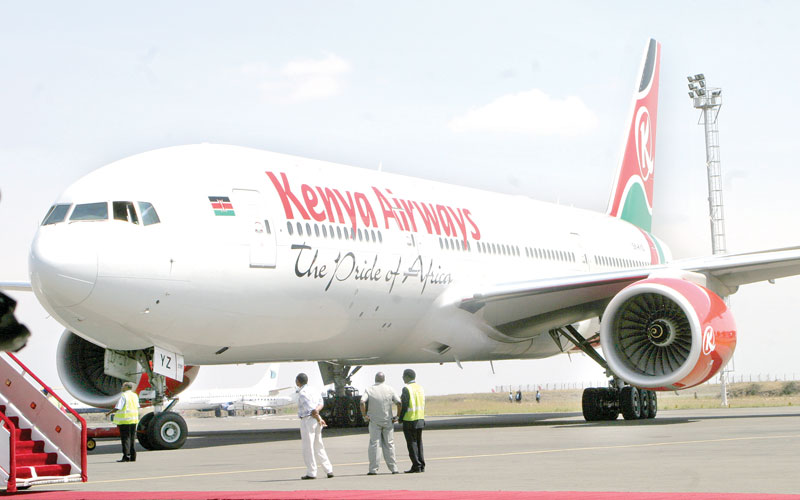KQ faces turbulent skies in 2020 as Mikosz leaves office
By Seth Onyango, December 27, 2019While awaiting a new substantive boss seems like a major challenge for Kenya Airways (KQ), the carrier stares into an uncertain 2020 amid warning from aviation experts, its board and the outgoing chief executive Sebastian Mikosz that it faces imminent collapse unless its nationalised.
However, internal challenges, including wrangles with staff meant that the boss cannot make any meaningful changes.
Scuttles by a section of workers topped problems afflicting what was once considered the Pride of Africa.
These are some of the issues which Jambojet boss Allan Kilavuka, who has been appointed acting KQ CEO will have to contend with. Kilavuka’s new role will be effective January 1, 2020, until a substantive replacement is found.
“The process is still actively ongoing and the board will inform all our stakeholders once a suitable candidate has been identified,” read a statement from KQ board.
Going into 2020, the corner office will more importantly worry about the company’s financial situation with chairman Michael Joseph maintaining during the year that the struggling airline requires about $450 million (Sh45 billion) to get on the recovery path.
Communised airlines
But there is a caveat, KQ will still struggle to slide to profitability as it faces stiff competition from communised Ethiopian and Rwandan airlines which offer better ticket rates.
Under the prevailing conditions, it is clear things will get worse before they get better for the national carrier.
First, KQ has yet to secure a multi-billion-shilling bailout package from the exchequer to temporarily keep it afloat even as talks to nationalise it gather momentum.
On November 16, the airline held talks with Treasury but nothing has been forthcoming.
But as its woes deepen, it emerged last month that taxpayers risked losing Sh75 billion to the airline’s creditors if an urgent stopgap deal is not sealed to avert its collapse.
Last month, Joseph revealed that the Sh45 billion he seeks could keep the airline afloat despite turbulence.
“Give me $450 million and that is what I need…then we do not need to go through this charade of nationalisation. We will have enough resources on which to grow and change the future of the airline,” he said during a TV interview.
And appearing before National Assembly Transport Committee Joseph warned that the airline faced imminent collapse if the restructuring does not happen in the next six months.
“In the next six months we must conclude this process. If we don’t, we are in danger of KQ no longer becoming a strategic asset of this country…we are going to consider measures that are not going to be very pleasant,” he said.
“The current financial situation of KQ is quite critical and if we know there is going to be a timeline, then we can proceed with some form of planning but right now, we have no timeline, we do not know when this process (nationalisation) is going to end. We have seen the result of the Privately Initiated Investment Proposal (PIIP) which was abandoned.”
Emulate Ethiopian Airlines
A fortnight ago, Mikosz told Reuters that the national carrier must be communised quickly to free it from financial constraints. “It is so important to have the nationalisation done speedily,” he said.
Lawmakers had in July voted to renationalise the loss-making airline, which is 48.9 per cent state-owned, 7.8 per cent held by Air France-KLM, and 38 per cent owned by local lenders, hoping to emulate the success of state-owned Ethiopian Airlines, sub-Saharan Africa’s biggest airline.
In September, KQ withdrew the PIIP as part of its turnaround strategy before MPs threw cold ice on it.
It had also sought to establish a holding company (holdco) which would host four subsidiaries.
The subsidiaries would comprise Kenya Airways, Kenya Airports Authority (KAA), Jomo Kenyatta International Airport (JKIA), and a centralised aviation college.
Carrier delisting
On nationalisation and delisting of the carrier, Transport Principal Secretary Esther Koimett assured the government will by December 20 have appointed a transaction expert to draw up an implementation plan with clear timelines.
KQ has been struggling to return to profitability and growth.
A failed expansion drive and a slump in air travel forced the airline to restructure a Sh200 billion debt in 2017.
It later proposed taking over the running of Nairobi’s main airport to boost its revenue, but that was rejected by the transport committee.
With the planned nationalisation, the government seeks to emulate countries like Ethiopia that run air transport assets under a single company.
They generally use funds from the more profitable parts to support less lucrative enterprises, such as national airlines. But Joseph argues: “Nationalisation will not save us.”
